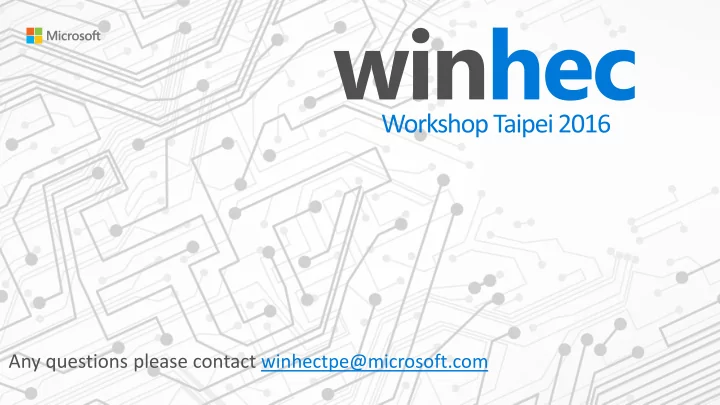

Any questions please contact winhectpe@microsoft.com
GPIO I 2 C, SPI UART • Used as an interrupt or • Simple Peripheral • High Speed UART for general I/O Buses (SPB) = I 2 C, SPI • Up to 20Mbps • Buttons, switches, • I 2 C: 100Kbps-3.4Mbps, • Typically used for: lights, system wake, SPI: Up to 160Mbps • Bluetooth, etc. • Typically used for: • GPS • Interrupts for SPB, • Input / HID serial, and other buses • Radios • Sensors • Power management
Raspberry Pi 2 MinnowBoard MAX Qualcomm Snapdragon 410
UMDF Class Extension Driver (e.g. Sensor Class Extension) Peripheral Device Driver UMDF KMDF Class Extension Bus KMDF Class Extension Bus Driver Driver Bus Controller Driver Bus Controller Driver KMDF IHV SoC Vendor Peripheral Hardware Microsoft
UMDF V2 Sensors Class Extension ADXL345Acc Driver (UMDF V2.0) SpbCx.sys GpioClx.sys I2C Controller GPIO Controller Driver Driver IHV SoC Vendor ADXL345Acc Peripheral Microsoft
Windows 10 IoT Core contains new APIs for accessing GPIO, I2C, SPI, and UART directly from user mode New driver called rhProxy exposes GpioClx and SpbCx resources to user mode No additional drivers needed Detailed document “Enabling Usermode Access to GPIO, I2C, SPI, UART” by Jordan Rhee can be obtained from Connect site.
API Resource Hub Proxy Driver (rhproxy) SpbCx.sys GpioClx.sys I2C Controller GPIO Controller Driver Driver IHV SoC Vendor ADXL345Acc Peripheral Microsoft
http://ms- iot.github.io/content/en- US/Downloads.htm
Scope (\_SB) _HID – Hardware Id. Set this to a vendor-specific { hardware ID. _CID – Compatible Id. Must be “MSFT8000”. Device(RHPX) _UID – Unique Id. Set to 1. { Name(_HID, "MSFT8000") Name(_CID, "MSFT8000") Name(_UID, 1) …
// Index 0 SPISerialBus( // SCKL - GPIO 11 - Pin 23 // MOSI - GPIO 10 - Pin 19 // MISO - GPIO 9 - Pin 21 // CE0 - GPIO 8 - Pin 24 // Index 1 0, // Device selection (CE0) SPISerialBus( // SCKL - GPIO 11 - Pin 23 PolarityLow, // Device selection polarity // MOSI - GPIO 10 - Pin 19 FourWireMode, // wiremode // MISO - GPIO 9 - Pin 21 0, // databit len: placeholder // CE1 - GPIO 7 - Pin 26 ControllerInitiated, // slave mode 1, // Device selection (CE1) 0, // conn. speed: placeholder PolarityLow, // Device selection polarity ClockPolarityLow, // clock polarity: placeholder FourWireMode, // wiremode ClockPhaseFirst, // clock phase: placeholder 0, // databit len: placeholder "\\_SB.SPI0", // RscSource: SPI bus ctrl name ControllerInitiated, // slave mode 0, // ResourceSourceIndex 0, // conn. speed: placeholder // Resource usage ClockPolarityLow, // clock polarity: placeholder ) // Vendor Data ClockPhaseFirst, // clock phase: placeholder "\\_SB.SPI0", // RscSource: SPI bus ctrl name 0, // ResourceSourceIndex // Resource usage ) // Vendor Data
+ Corresponding DSD // Index 3 I2CSerialBus( // Pin 3 (GPIO2, SDA1), 5 (GPIO3, SCL1) 0xFFFF, // SlaveAddress: placeholder , // SlaveMode: default to ControllerInitiated 0, // ConnectionSpeed: placeholder , // Addressing Mode: placeholder "\\_SB.I2C1", // ResourceSource: I2C bus controller name , , ) // VendorData
-Declare all pins on -Do not declare pins that are reserved for system exposed headers. functions -Declare pins that are -Do not declare pins that connected to useful are not connected to onboard functions like anything. buttons and LEDs.
+ Corresponding DSD // Index 4 – GPIO 4 GpioIO(Shared, PullUp , , , , “ \\ _SB.GPI0”, , , , ) { 4 } GpioInt(Edge, ActiveBoth, Shared, PullUp , 0, “ \\ _SB.GPI0”,) { 4 } // Index 6 – GPIO 5 GpioIO(Shared, PullUp , , , , “ \\ _SB.GPI0”, , , , ) { 5 } GpioInt(Edge, ActiveBoth, Shared, PullUp , 0, “ \\ _SB.GPI0”,) { 5 }
+ Corresponding DSD // Index 2 UARTSerialBus( // Pin 17, 19 of JP1, for SIO_UART2 115200, // InitialBaudRate: in bits ber second , // BitsPerByte: default to 8 bits , // StopBits: Defaults to one bit 0xfc, // LinesInUse: 8 1-bit flags to declare line enabled , // IsBigEndian: default to LittleEndian , // Parity: Defaults to no parity , // FlowControl: Defaults to no flow control 32, // ReceiveBufferSize 32, // TransmitBufferSize "\\_SB.URT2", // ResourceSource: UART bus controller name , , , )
Modify ASL Run HLK/ Append ACPI Test Tools table Build a full version of ASL changes
DefinitionBlock ("ACPITABL.dat", "SSDT", 1, "MSFT", "RHPROXY", 1) { Scope (\_SB) { Device(RHPX) { ... } } }
GpioTestTool http://ms-iot.github.io/content/en-US/win10/samples/GpioTestTool.htm I2cTestTool http://ms-iot.github.io/content/en-US/win10/samples/I2cTestTool.htm SpiTestTool http://ms-iot.github.io/content/en-US/win10/samples/SpiTestTool.htm MinComm (Serial) https://github.com/ms-iot/samples/tree/develop/MinComm
GPIO https://msdn.microsoft.com/en-us/library/windows/hardware/mt591939(v=vs.85).aspx https://msdn.microsoft.com/en-us/library/windows/hardware/mt591936(v=vs.85).aspx I2C SPI https://msdn.microsoft.com/en-us/library/windows/hardware/mt591929(v=vs.85).aspx
Erroneous Correct Device(MTST) Device(MTST) { { Name(_HID, "MSFT8000") Name(_HID, "MSFT8000") Name(_CID, "MSFT8000") Name(_CID, "MSFT8000") Name(_UID, One) Name(_UID, One) Method(_CRS, 0x0, Serialized) Method(_CRS, 0x0, Serialized) { { Name(UBUF, ResourceTemplate() Name(UBUF, ResourceTemplate() { { SPISerialBus(0, PolarityLow, FourWireMode, 0x8, SPISerialBus(0, PolarityLow, FourWireMode, 0x8, ControllerInitiated, 0x7a1200, ClockPolarityLow, ControllerInitiated, 0x7a1200, ClockPolarityLow, ClockPhaseSecond, "\\_SB.SPI1", 0, ResourceConsumer, , ) ClockPhaseSecond, "\\_SB.SPI1", 0, ResourceConsumer, , ) I2CSerialBus(0xff, ControllerInitiated, 0x61a80, I2CSerialBus(0xff, ControllerInitiated, 0x61a80, AddressingMode7Bit, "\\_SB.I2C1", 0, ResourceConsumer, , ) AddressingMode7Bit, "\\_SB.I2C1", 0, ResourceConsumer, , ) }) … Name(_DSD, Package(0x2) }) // erroneous!! cannot be a child of _CRS. Must be child of … Device() } { Name(_DSD, Package(0x2) // Correct!! {
ACPI 5.0 specification http://acpi.info/spec.htm Asl.exe (Microsoft ASL https://msdn.microsoft.com/en-us/library/windows/hardware/dn551195(v=vs.85).aspx Compiler) Windows.Devices.Gpio https://msdn.microsoft.com/en-us/library/windows/apps/windows.devices.gpio.aspx Windows.Devices.I2c https://msdn.microsoft.com/en-us/library/windows/apps/windows.devices.i2c.aspx Windows.Devices.Spi https://msdn.microsoft.com/en-us/library/windows/apps/windows.devices.spi.aspx Windows.Devices.SerialCom https://msdn.microsoft.com/en- munication us/library/windows/apps/windows.devices.serialcommunication.aspx Test Authoring and https://msdn.microsoft.com/en-us/library/windows/hardware/hh439725%28v=vs.85%29.aspx Execution Framework (TAEF) SpbCx https://msdn.microsoft.com/en-us/library/windows/hardware/hh450906(v=vs.85).aspx GpioClx https://msdn.microsoft.com/en-us/library/windows/hardware/hh439508(v=vs.85).aspx SerCx https://msdn.microsoft.com/en-us/library/windows/hardware/ff546939(v=vs.85).aspx MITT I2C Tests https://msdn.microsoft.com/en-us/library/windows/hardware/dn919852(v=vs.85).aspx GpioTestTool http://ms-iot.github.io/content/en-US/win10/samples/GpioTestTool.htm I2cTestTool http://ms-iot.github.io/content/en-US/win10/samples/I2cTestTool.htm SpiTestTool http://ms-iot.github.io/content/en-US/win10/samples/SpiTestTool.htm MinComm (Serial) https://github.com/ms-iot/samples/tree/develop/MinComm Hardware Lab Kit (HLK) https://msdn.microsoft.com/en-us/library/windows/hardware/dn930814(v=vs.85).aspx
Calls to Action We want to hear from you! Join WinHEC LINE Community @winh nhec ec Please Complete the Evaluation Form and return it to our reception. Your input is highly important to us! Thank you!!
Recommend
More recommend